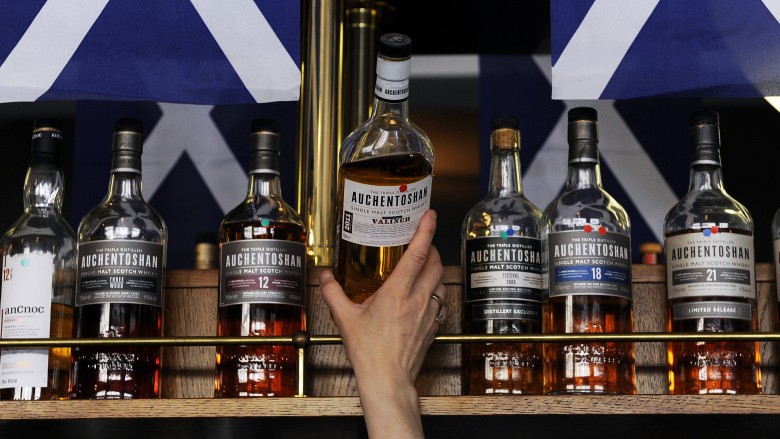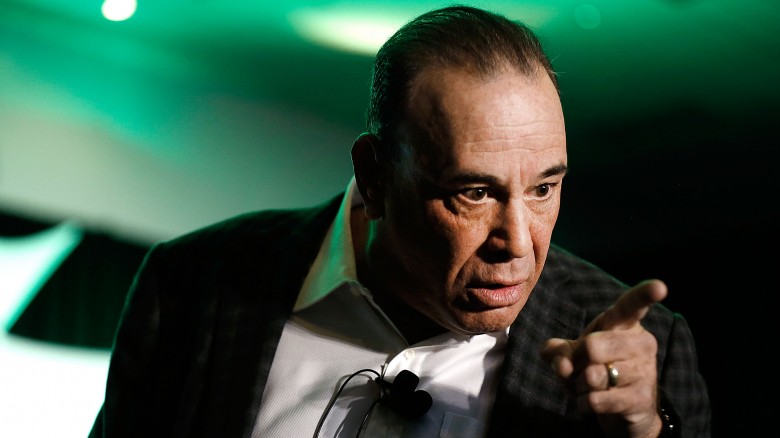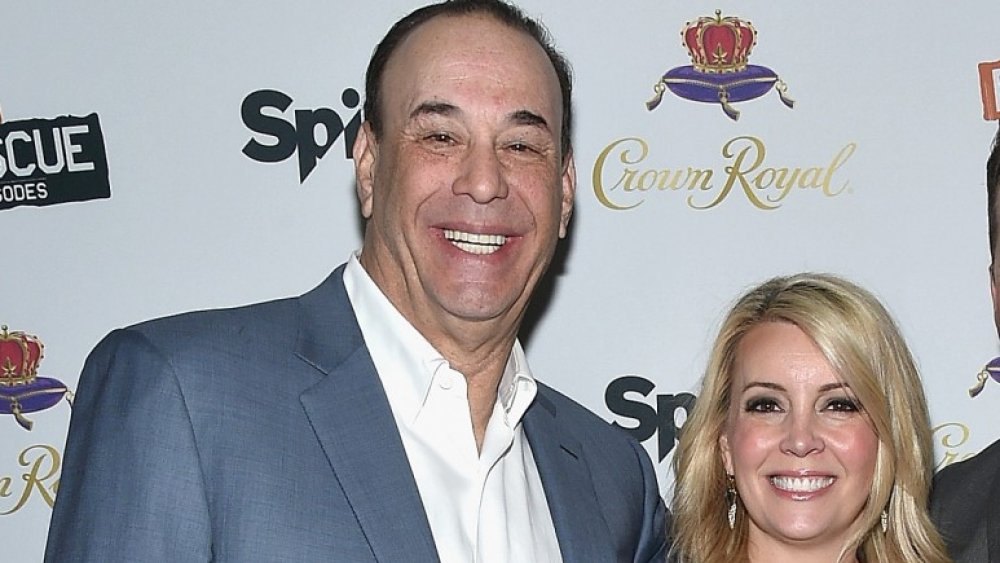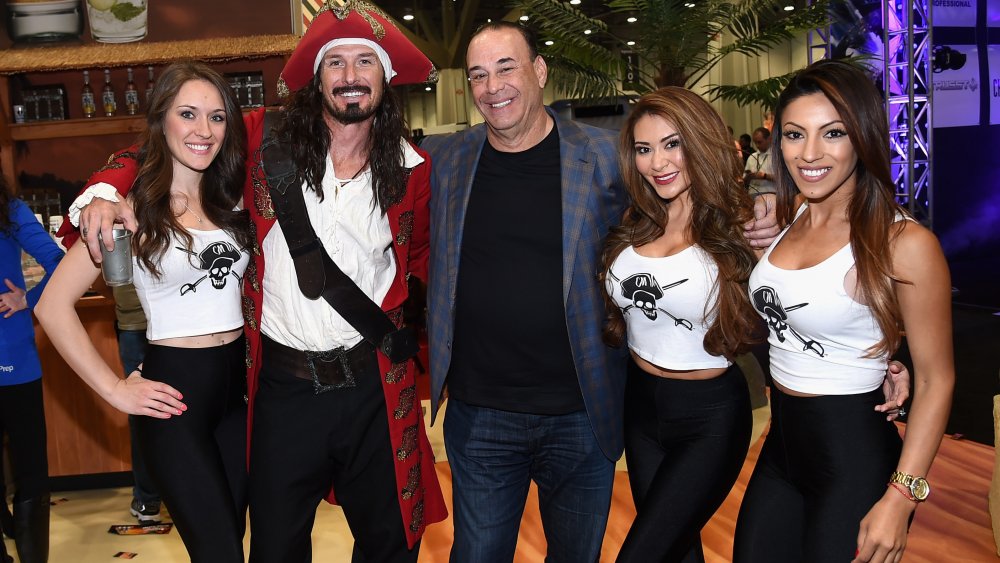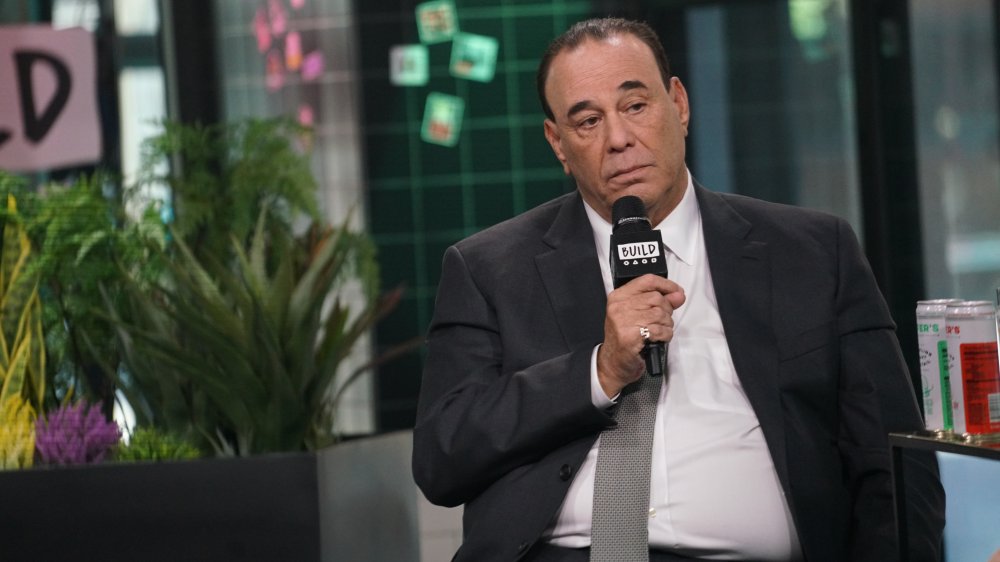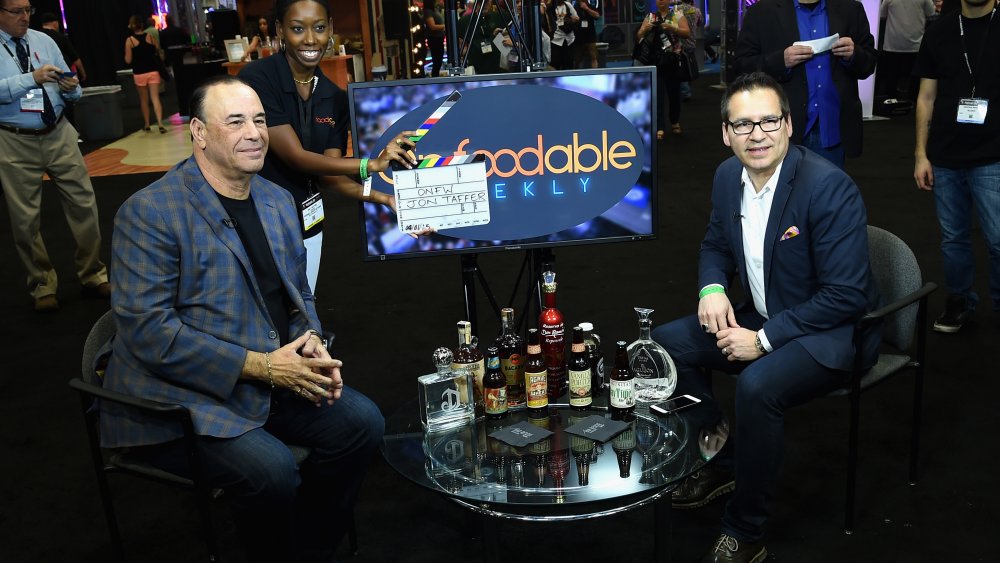The Untold Truth Of Bar Rescue
Jon Taffer is an American hero. After all, he's trying to save bars, and as of April 2022, he's attempted to help over 200 bars. The typical U.S. bar goes through ups and downs, depending on what's hip, and it's his job via the "reality" show "Bar Rescue" to take a failing bar and mold it into something that will work. Sometimes that's a drastic change, sometimes it's a change of attitude, but it's always good TV. Reviving struggling bars across the United States doesn't come without a little drama. As anybody who has watched even a single episode knows, Taffer is prone to yelling and won't hesitate to "Shut it down!"
Throughout the show's run, there have been success stories as well as a few controversies and a number of spin-offs. (Want Jon Taffer to save your marriage? He can do that! Or at least try to.) Let's dive into the ups and downs of the popular show and what fans don't always see when the cameras are rolling.
How they pick the bars to be on Bar Rescue
Landing a spot on a reality show where someone is willing to spend their money to save your failing business seems like a pretty sweet deal. The actual task of getting on the show is pretty straightforward; you simply fill out an application just like if you were trying for a coveted busboy spot at your local watering hole.
Of course, that's just one way; "Bar Rescue" has another method; by narrowing down geographic areas. The show producers will sometimes do an open call in certain cities or geographical areas looking for distressed bars. Other times, they'll do all the legwork and call bars themselves to see if they're interested in appearing on the show.
Bar Rescue's Jon Taffer ran the Troubadour
The famed Troubadour in West Hollywood is an American institution. The list of artists who played at the bar/coffeehouse is a who's who of all the best musical acts. It's where Bob Dylan first plugged in, Elton John made his U.S. debut, and where John Lennon and Harry Nilsson — drunk on brandy Alexanders — heckled the Smothers Brothers.
Jon Taffer ran the Troubadour during a transition period when the music changed from folk to punk. He was there when Harry Nilsson — again drunk on brandy Alexanders — got into it with punk fans. He also was on hand for the Troubadour's 25th anniversary when a lot of big names came back as a fundraiser of sorts to help fix the broken plumbing responsible for standing water in the kitchen. Taffer's resume is quite extensive, managing bars and coffee shops on both coasts before opening his own bar in 1989. So he can walk the walk to an extent.
Everyone hates Jon Taffer of Bar Rescue
But for someone with an impressive CV like Taffer, there are a lot of people ticked at him. And it's not just your average Joe who doesn't like a brash New Yorker who yells a lot. No, many accomplished bartenders hate Jon Taffer. Why? Well, he often says stuff that is flat out wrong, like this: "Tequila is inherently made from mezcal, which mescaline, the hallucinogenic drug is made from. So tequila can have a hallucinogenic component, you might be talking to someone who's not there." In the real world, tequila and mescaline come from plants with similar names, but those plants are in very different families. It might be an easy mistake to make for a layperson, but someone like Taffer should know better.
And that's not the only questionable thing he's said. You know how to cure a hangover? Don't drink too much. Given the price of time machines, that'll be tough when you're on your fourth screwdriver. That reminds me: the screwdriver, the drink Taffer said every bartender should know how to make. It's orange juice and vodka; the alcohol equivalent of Gordon Ramsay saying every chef should know how to make a PBJ. Deep insights.
Bar Rescue has been accused of fakery
If you don't already know this show is fake, then I have a bridge to sell you. But hey, you don't have to watch one whole episode of the show to find out it's fake. People who have been on the show will save you the time and just tell you. Like Nina Wyatt of Schafer's Bar and Grill, who said the crew fed them lines. She isn't the only one throwing around accusations. Owner Ryan Burks said, "During my first interview I was asked how much money we are losing each month. My exact words to the producer were, 'What would you like me to say?' Producer's response: 'For our story you are losing $10,000 a month and losing your house and closing down next month.' All of which isn't true." Yikes.
Piratz Tavern said just about the same thing. "It was basically coerced and staged to be an opening act for a re-rescue. I was told to bring in several changes of clothes to make it appear that filming covered several days. As usual they brought in a bunch of extras to fill the house and we were told what to say and with whom to speak." Too many bars are saying they're fed lines and too many camera angles are just right and too many lines are really, really badly delivered for this to be anything but set up at the least.
Bar Rescue's Jon Taffer has ties to the NFL Sunday Ticket
"Bar Rescue's" Jon Taffer ran a very successful sports bar. That, you can say, is the first time where his expertise came into play. Executives with ComSat approached Taffer about an idea they had; would out-of-market NFL games play well in sports bars? Taffer dove into the project and wrote up a market analysis on how much bars could afford to pay to carry non-local NFL games and what the impact would be on their business.
And thus the predecessor of NFL Sunday Ticket was born. This meant you didn't have to be stuck in a TV market like Orlando watching only Tampa Bay or Jacksonville games on the local broadcasts. Instead you could go to a bar and watch your beloved West Coast or Midwest team because you probably just moved to Orlando a few months earlier to get away from the cold. ComSat took the idea to the NFL — complete with Taffer's marketing plans — and the NFL loved it. In fact, the NFL loved it so much they did it themselves. They even hired Taffer away and he worked on the Advisory Board for NFL entertainment for a few years. He didn't "invent" NFL Sunday Ticket, but he certainly shaped what it is today.
Bar Rescue's shooting schedule is intense
Once a bar does agree to appear on the show, things move pretty quickly. Taffer and crew take five days to complete a bar rescue. That includes Taffer evaluating the actual bar being redone and scouting competing bars. Each day is about a 12-hour shoot with the second day being the crazy one; that's where he yells at the bar owners and tells them what a horrible job they're doing. According to a Reddit post written by someone claiming to be a "Bar Rescue" producer, hidden cameras are placed before the full crew arrives, and the normal pre-production shooting takes place then as well. By Day 5 the bar is back open with the remodel, and that's that.
The makeover is cosmetic and financial. That same Reddit post reveals something painfully obvious as you watch the show, whether or not it's fake: a lot of people have no clue how to manage a business. You can remake a building in five days, but teaching someone the basic principles of turning a profit takes a lot longer. The inability to understand cost and margin is a big contributor to bar failures. And Taffer is an expert on going broke. He once lost $600,000 in a failed startup. His financial decisions have definitely gotten better since then, but a lot of bars don't heed his financial advice.
Jon Taffer's signature Bar Rescue phrase is trademarked
Any TV show is only as good as its catchphrase. Let's face it, having a catchphrase, well, it's huge! Jon Taffer stumbled upon one himself. When a bar is in violation of something — health code or just normal business practice — Taffer unleashes an unearthly "Shut it down!" that would make a honey badger jump. Given it has become a catchphrase, Taffer did the smart thing: "Shut It Down" is trademarked. That also means that Taffer is the exclusive seller of Shut It Down merchandise, so if you need a Shut It Down button with Taffer barking out the phrase, it can be yours for a cool $20 plus shipping. (It should be noted that pressing the button probably won't actually shut anything down.) Taffer actually owns 38 trademark applications with the U.S. Patent Office for various items.
Bar Rescue had a murder episode
In 2013, Jon Taffer and the "Bar Rescue" crew went to Nashville to save the Pit and Barrel. The show makes it seem like the bar's owner, Chris Ferrell, was part of the problem, as he displayed a short temper with his staff. By the end of the episode, Chris had seen the Taffer way and "Bar Rescue" ran a graphic that claimed Chris had not lost his temper with the staff after the episode. Unfortunately, he later lost his temper at a patron.
Outlaw country singer Wayne Mills drank at the Pit and Barrel on November 23, 2013. After the bar closed for the evening, Ferrell and Mills — who were friends — got into an argument. Ferrell shot and killed the country singer, and he later claimed self-defense. The episode had not aired yet on Spike TV and was immediately pulled from the rotation, but then it was aired anyway. Spike quickly issued a statement apologizing for the incident. The first airing had been removed but the second, late-night re-broadcast had not been. But the damage was done, and many fans were offended. A jury eventually found Ferrell guilty of second-degree murder. He received a 20-year sentence for the crime.
Chrissy Teigen's not a huge fan of Bar Rescue
If you've ever thought "Bar Rescue" was just a bit too formulaic, you're not alone — Chrissy Teigen agrees with you, and she's not afraid to tweet her thoughts.
"I don't understand why some of the bar owners on bar rescue need someone to come in and tell them to maybe not serve raw chicken ice cream and probably stop letting cockroaches sleep in the alcohol bottles," she tweeted, adding, "you're right. The raw chicken ice cream... does not sell well."
Pop Culture says that it didn't take long for others to jump on the bandwagon with similar criticisms, and Jon Taffer himself responded just a few days later: "You'd be surprised at what I come across @chrissyteigen, as a matter of fact, come do a rescue with me!"
Are we going to see that? Given that she had tweeted a few years prior that she'd be interested in making an appearance but thought she was too old for his demographic, who knows?
Jon Taffer says Bar Rescue is all about excuses
There's been a lot of failing bars featured on "Bar Rescue," and according to Jon Taffer, he's found that there's one thing that they all have in common: excuses.
At a speech for the 2019 Nightclub and Bar Expo in Las Vegas, he explained (via AmericaJr) just how often bar owners had a reason ready and waiting for their failure, and just how often they put the responsibility on their own shoulders: "Out of the 120 bar rescues, never once... I'm failing because of me. Every time, it's the competition or it's Congress. They have every freaking excuse but themselves. An excuse is a reconciliation of a mistake. Excuses are your enemies. Excuses kill us."
According to Inc., Taffer boils those excuses down to just a few different categories: they're made because of fear (like hurting someone's feelings), because owners think they know everything or don't know enough, because of egos that get in the way, or because they blame a scarcity of something, whether it's time or money. It all comes back to the same things over and over again, and according to Taffer, getting rid of those excuses is the only thing that really sets them up for success in the future. If they can't do that, there's little hope for their business.
What's Bar Rescue's success rate?
So, how many of these failing bars have owners that end up listening to Jon Taffer's advice and saving their business?
According to Bar Rescue Updates, he'd tried to help 205 bars as of April 2022. Of those, 101 stayed open, 94 closed, and 11 had gone up for sale.
That's not terrible, and when BroBible asked him about his failures, he said that he really doesn't mind when one of the bars he tried to save ultimately fails. He put it like this: "Can I be cocky for a second? If I hit a home run 80 percent of the time, and you want to talk about the 20 times I miss swinging the bat, I'm ok with that. But, I hit 80 percent of the time. So I have no embarrassment [...]"
And here's the interesting thing — even after Taffer leaves, he still keeps an eye on how all the bars are doing. All the cash registers he installs in bars are connected to an app that pings his phone: he knows exactly how well — or how badly — they're doing, and whether or not they're using the systems he put in place. But at the end of the day, he says he doesn't get upset about the failures: "You're talking to a guy who buys and sells restaurants and bars with no connection to them. They don't live and breathe. They don't have blood. It's a business."
Bar Rescue's most expensive rescue was a massive fail
Remodeling an entire bar is never cheap, but it was the remodel of the LA Brewing Company that was dubbed the most expensive renovation in "Bar Rescue" history. And it was a massive fail.
It started, says BroBible, when a legal dispute between partners kicked off some serious problems, and they called Jon Taffer in to stop the bar from suffering because of it. He added some seriously incredible things, like brewing vats and a huge brewing system. The price tag ran into the hundreds of thousands of dollars, but months later, they were still failing.
Taffer told BroBible that they failed because they never even turned on things like the massive brewing system he installed, and he made it clear that he believed the fault rested solely on them. But LA Weekly found that there was more to the story — they hadn't implemented many of the changes, but as for that brewing system, part of the problem was that the show didn't help them get the permits they needed to brew on-site. No permits, no brewing. But that was just a small part of the problem: menu changes were ignored, there were only a few beers on tap, and when word got to Taffer that they were selling the bar to get out from underneath their debt, he had this to say: "So at the end of the day, I got to leave them in a better place."
You only see a bit of what Jon Taffer does on Bar Rescue
"Bar Rescue" isn't a terribly long show, and there's only so much that makes it into the final cut. When Jon Taffer spoke with Forbes, he wanted to make sure they knew that he does much more than you see on TV.
"... when I created 'Bar Rescue,' I didn't realize that it would be so invasive," he told them. Not only does it take 12- to 14-hour days at least five days a week, but he's also operating at high speed. He's doing all the designing of the bar, the logos, the new names, redesigning all the menus, figuring out pricing, and along the way? "And I do all of that while I'm there. And, while I'm shooting the show, I get 80 to 100 emails a day, picking paint colors, designs, furnishing, menus, logos, interior colors. So I have to do the projects while I shoot the show."
And he minds — a lot — but not for the reason you might expect. "...what kept me up at night when I first got [the show] wasn't doing the show, but turning my back on everything that wasn't the show. That's what was scary to me."
Bar Rescue has multiple spin offs
If Jon Taffer wasn't so...Jon Taffer, then "Bar Rescue" may not have existed. In an interview with Hype Magazine, Taffer talked about how he pitched an idea for a TV show to Paramount called "On the Rocks," which was like a mix between "Restaurant: Impossible" and "Kitchen Nightmares," but with bars. Paramount told him that "he would never be on television," citing that he was too old and not attractive enough, and Taffer decided to produce it himself, until it eventually got picked up by Spike. The irony of it all –– "Bar Rescue" now streams on Paramount, so there's to sticking it to the man.
"Bar Rescue" has also inspired a few not-as-successful spin-offs hosted by Taffer, like "Hungry Investors" –– a mix between "Shark Tank" and "Kitchen Nightmares" — that puts restaurants against each other to battle it out for an investment. Taffer also teamed up with restaurant-fixing demigod, Robert Irvine from "Restaurant: Impossible," to battle it out on their show, "Restaurant Rivals," where they compete against each other to see who can "best" flip a failing restaurant. Then, a personal favorite of ours, is "Marriage Rescue," where Taffer plays a marriage counselor and tries to fix marriages filled with screaming and cussing with more screaming and cussing. It probably worked for some people.
The owner's don't have to pay for the renovation
With most bars getting a complete makeover complete with high-tech bar equipment and free liquor, it's hard to imagine how struggling businesses could pay for everything, and who would have the money to? With Taffer's net worth valued at $14 million dollars, it's hard to imagine how deep his pockets go, especially with some especially expensive "Bar Rescue" renovations. In a Q&A on Taffer's website, he explains that he and his sponsors pay for everything on "Bar Rescue" in terms of renovations, and even provides a full food and beverage inventory, along with dining ware, and bar supplies.
His sponsors also do a good job of opening their hearts, pockets, and checkbooks as well. In an interview with Brobible, Taffer explained that the companies and sponsors, like Partender, HarbourTouch, Diageo Spirits, involved in the show are his business partners, and help front the money for remodeling and donate equipment or products. Free products equals free product placement –– everyone wins.
Bar Rescue's season during COVID was different than the rest
With over 110,000 bars and restaurants closing in 2020, it's no surprise that the hospitality industry was rocked by the pandemic. Taffer told People Magazine that they had to abruptly stop filming in the middle of the 2020 season, which, like the pandemic, was something that they had never experienced in past filming.
After returning for Season 8, Taffer decided to focus on helping bars exclusively in his stomping grounds of Las Vegas. Taffer told LA Mag that Season 8 would focus on helping "family-owned bars around the city that typically serve the hospitality employees who serve (tourists)," with less fighting and more happy tears. He told People Magazine that "rather than beating (people) up this year, I've got to motivate them ... and get them to feel good about their establishment again."
Aside from the "life-me-up" attitude, Season 8 of "Bar Rescue" had its fair share of COVID restrictions, from daily testing while filming, to a remote control center where Taffer ran recons and stress tests (via People). With the rising costs of building materials during the pandemic, it made their 24-hour bar remodel almost impossible and more expensive. Taffer also told Distractify in an interview that the new season would not have "Back to the Bar" updates in order to focus on helping more bars.
Bar Rescue has been sued ... a couple of times.
Jon Taffer is someone who tends to ruffle a few feathers when it comes to his larger-than-life personality, colorful word choice, and the lack of regard for people's feelings. However, the thing that makes him most iconic has gotten him in hot waters. In 2014, Taffer, his wife and "Bar Rescue's" production agency, Bongo LLC, were sued by Las Vegas doctor and part-owner of the Sand Dollar, Paul Wilkes. When Taffer sent his wife into the Sand Dollar undercover for a Season 3 episode, Wilkes made sexual comments to Taffer's wife, causing Taffer to punch and break a glass in Wilke's face. Wilke filed an assault and battery complaint against Taffer, alleging that producers set him up to stir the pot and flirt with Taffer's wife for dramatic effect. In 2017, Taffer's lawsuit was dismissed and settled out of court.
In addition, in 2016, Tsang Han Wang filed a lawsuit against Taffer for alleged racial and sexual discrimination, claiming that he was fired because Taffer preferred to employ young, attractive women, and targeted him because of his race. Wang was seeking a settlement, and it is unclear if they settled out of court, but it's not a good look for Taffer.
People were outraged with Taffer's comment about unemployed workers
During the pandemic, chefs and restaurateurs have been put in the hot seat over comments made about the hospitality industry's handling of the pandemic, specifically unemployed workers. Big-time food personality, Guy Fieri, was scrutinized for "comparing workers collecting unemployment to kids filling up on Doritos," and saying that " you can't sit on your ass and expect (work or money) to come to you" in a New York Times podcast, "Sway."
In August 2021, Taffer also came under fire in a Fox News interview with Laura Ingraham after calling unemployment a demotivation from the job hunt, and comparing unemployed workers to hungry dogs. Twitter comments around the remark fumed, calling Taffer's comments "incredibly cruel," and pointing out that Taffer himself received PPP loans during the pandemic totaling over $60,000. Taffer quickly tweeted after his interview, apologizing for his poor analogy choice, saying that the sentiment was a response to a wish to return to normal (don't we all).

